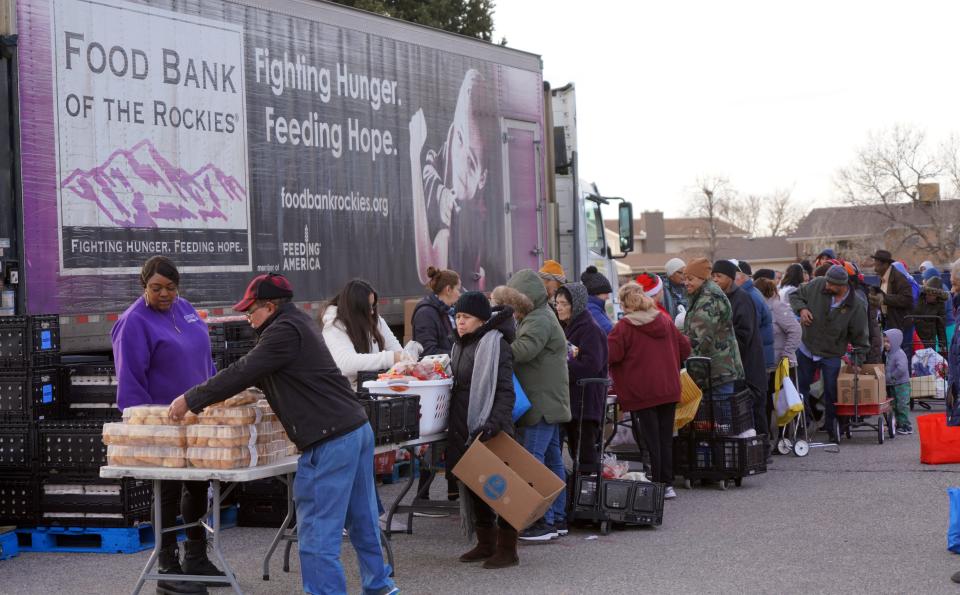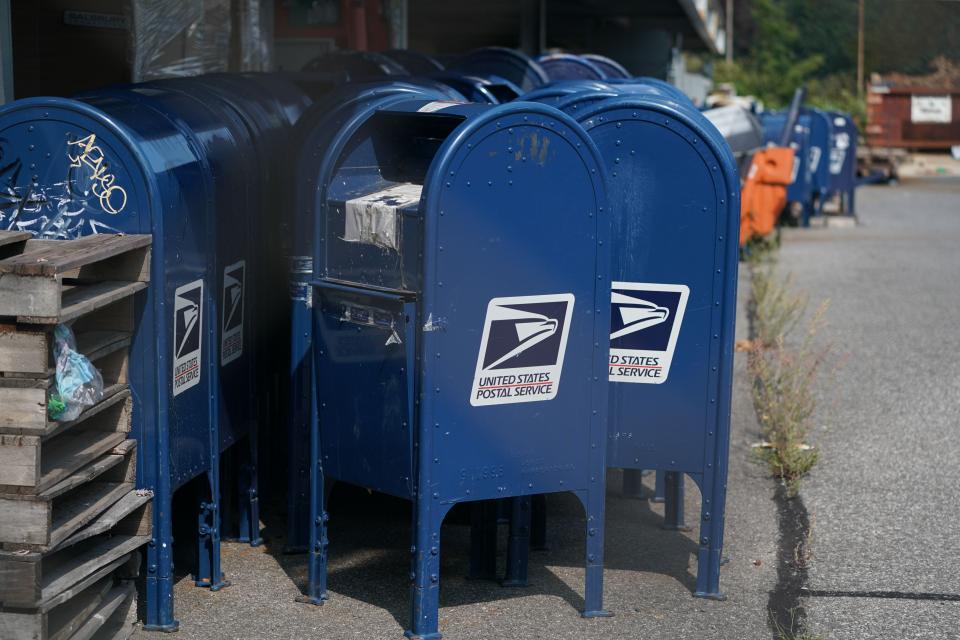What does a federal government shutdown mean? How you and your community could be affected
Longer airport lines. Hazardous drinking water. Shuttered national parks.
The disruptions that come with shutdowns of the federal government have only become more familiar to Americans in recent years. If congressional Republicans fail to cut a deal by this weekend, the country could see its 22nd shutdown in the last five decades.
Amid largely stalled negotiations on Capitol Hill, the federal Office of Management and Budget has already begun the process of advising agencies which employees it may have to furlough ahead of a looming deadline Saturday at midnight.
The last time Congress failed to pass a government spending bill, nearly a million Americans were furloughed or went without pay, President Joe Biden wrote on X, formerly Twitter. Processing times at the Internal Revenue Service slowed down. Military families had less access to critical family support programs. Some federal support for Indigenous tribes came grinding to a halt.
But every shutdown is different, and federal agencies are still parsing through the details of what another one might look like. Here are some of the ways it could impact you and your family:
Will child care or day care be affected by government shutdown?
Although K-12 and higher education policy is largely handled at the state and local level, the impact on families could be significant, particularly when it comes to federally supported child care services.

“As workers go without pay, families go without child care, poor families lose support for housing and food, and schools feel the squeeze,” said David R. Schuler, executive director of the AASA: the School Superintendents Association, in a statement Friday urging lawmakers to keep the government open.
One of the programs that would be endangered right away is Head Start, which serves low-income families nationwide. According to the White House, 10,000 children across the country would immediately lose access to it, as the Department of Health and Human Services would be unable to award federal grants to child-care centers.
As in past shutdowns, that would force some preschool and school readiness centers to close, according to the Center for American Progress, a progressive think tank. Bobby Kogan, a senior director of federal budget policy at the center, wrote in a column last week that a shutdown “would have devastating impacts on essential programs that millions rely on for their health and safety.”
The longer it lasts, he wrote, the worse off those programs would be.
How will schools be affected by government shutdown?
The Education Department has yet to update its contingency plan for this year, but a 2021 blueprint offers an idea of how the agency would be forced to respond to a partial closure of the federal government.
For the first week, the department would be forced to furlough about 90% of its staff, per the most recent guidance. Federal student aid – in the form of Pell Grants and federal direct student loans – would keep flowing, but those programs would be operating with a minimum number of staff amid furloughs: what the department refers to in its 2021 guidance as “skeletal program operations.”
The lack of bandwidth could pose barriers for students with immediate needs, the department warned in 2021.
Exactly how long a shutdown drags on will be a key metric for assessing the likely damage it does. School districts and colleges, the Education Department said, would likely start to feel the hurt at the one-week mark.
“A protracted delay in Department obligations and payments beyond one week would severely curtail the cash flow to school districts, college and universities, vocational rehabilitation agencies, and other entities that depend on the Department’s discretionary funds to support their services,” the department’s guidance said.
Many colleges, for instance, rely on federal money to fund programs for disadvantaged students who wouldn’t otherwise go to college or are having trouble staying in school. So do rehabilitation agencies that offer services for young people with disabilities. In a drawn-out shutdown scenario, continued funding for those programs could be threatened.
How will food programs be affected by government shutdown?
During a White House briefing Monday, U.S. Department of Agriculture Secretary Tom Vilsack raised alarm about the “real consequences to real people” a shutdown could bring.

“The reality is that when there is a shutdown, we’re looking at significant disruption of the lives of millions of Americans,” he said.
The Supplemental Nutrition Assistance Program, or SNAP, which provides food benefits to millions of low-income families, would continue throughout the month of October, he said. But if the shutdown drags on longer than October, SNAP funding would be put at risk.
In more immediate danger would be the 7 million moms and children relying on the Special Supplemental Nutrition Program for Women, Infants, and Children, or WIC. That program, according to USDA, helps low-income mothers with infants and children at nutritional risk by offering easier access to things like food and health care referrals. Their benefits would dry up within a matter of days, Vilsack said, though some states might be able to use extra funding to stave off the effects for a week or two.
“They are the vulnerable who you don't want to have the cost of not having that benefit, a group of people who would be least able to bear the cost of the disruption,” said Maya MacGuineas, president of the Committee for a Responsible Federal Budget, a nonpartisan, nonprofit organization. “I would think that Congress would find a way for continuity of benefits, but I can’t guarantee it.”
During the last government shutdown four years ago, the government nearly ran out of SNAP funding that would’ve affected some 40 million Americans.
The White House warned that most Environmental Protection Agency inspections of drinking water and chemical facilities would also be put on hold.
How will government shutdown affect rural America?
As harvest season descends on farmers across the country, the impact of a beltway logjam would be felt in rural America too.
Similar to previous shutdowns, marketing loans for many farmers would enter into a state of limbo as Farm Service Agency offices in most U.S. counties shutter. More broadly, USDA-backed housing loans for rural families would cease as well.
“With a shutdown, those loans don’t take place,” Vilsack said. “It’s conceivable in those circumstances that not only are they not able to close the loan, it’s also conceivable that they may lose the deal.”
Will Social Security benefits be affected by government shutdown? What about Medicare?
About 8,500 of the Social Security administration’s nearly 62,000 employees would be furloughed in the event of a shutdown, according to its 2024 fiscal year contingency plan.
“We will continue activities critical to our direct service operations and those needed to ensure accurate and timely payment of benefits,” the plan states.
Under the plan, agency services that would continue without interruption include processing of benefit applications, appeal requests and hearings, post-entitlement actions such as address changes and the issuing of new and replacement Social Security cards. A few services – such as verification of benefits, or corrections and updates to earnings records – would be temporarily suspended.
According to the Bipartisan Policy Center, a nonprofit organization based in Washington, D.C., major programs and benefits such as Social Security and Medicare are generally unaffected by shutdowns because Congress has approved these programs to spend without an expiration date – what is known as mandatory spending, which comprises about $7 of every $10 spent by the federal government.
Will post offices be closed during a government shutdown?
The U.S. Postal Service “does not cease operations during any Federal lapse in appropriations as it is funded through a permanent no-year appropriation,” according to its 2024 fiscal year shutdown plan.
That’s in contrast to the Office of the Inspector General, which receives an annual appropriation from the Postal Service Fund as opposed to the U.S. Treasury. In the event of a shutdown, the office would continue operations using previously appropriate funds until they were depleted.
Once depleted, only Office of the Inspector General employees involved in agency activities “to protect life or property” – including law enforcement investigations and prosecutions of entities and individuals engaged in fraud or other postal service crimes – would continue, along with any support services necessary to maintain them.

How will housing programs and emergencies be handled during government shutdown?
While many federal programs such as homeless assistance grants and housing for veterans and those with disabilities will continue through a shutdown, most Department of Housing and Urban Development staff will not be in the office as there will be an extremely limited number of employees to answer emergency questions during a shutdown, HUD said.
In its contingency plan, HUD said that monthly assistance programs, including housing operating and housing choice subsidies and multifamily assistance contracts, will be in operation – as long as funding is available.
In terms of the Federal Housing Administration, HUD said “the processing or closing of FHA-insured loans may be delayed,” due to possible staff shortages.
How will government shutdown affect travel plans?
A government shutdown wouldn’t necessarily be detrimental to your travel plans. But air traffic controllers and TSA agents would have to work without pay. The White House has suggested this would lead to longer wait times and significant delays across the country.
During the 2019 shutdown, many of those federally supported workers started calling in sick in droves about two weeks in – that was when the airport woes set in.

Cruise vacations won’t necessarily feel the effects of a shutdown. National parks, on the other hand, could be impacted right away. While the decision on whether to close them will be up to the Biden administration, some of the nation's parks have closed entirely during past shutdowns. Those that stayed open – and unstaffed – were left in states of disarray.
Zachary Schermele is a breaking news and education reporter for USA TODAY. You can reach him by email at zschermele@usatoday.com. Follow him on X at @ZachSchermele.
Marc Ramirez is a national correspondent for USA TODAY. You can reach him by email at mramirez@usatoday.com.
Terry Collins is a national correspondent for USA TODAY. You can reach him by email at tcollins@usatoday.com.
This article originally appeared on USA TODAY: What would a federal government shutdown mean for you and your city?

